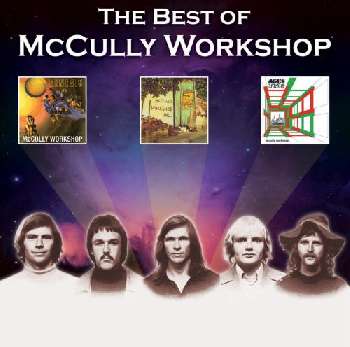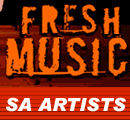The limited edition 2CD version of this album, released in 2005, also included a second disc: "Comedy Bootleg Live", recorded during the late 70's.
Still flying high..The
McCully Workshop Story (Sleeve notes [2010])
The McCullagh brothers, Tully (born Terence
on 31st May 1953) and Mike (born Michael on 7th
April 1947), have been an integral part of the South African music scene
for five decades now. In 1965 they started as a folk-rock trio with
Richard Hyam and called themselves the Blue Three. Richard had been
in a folk duo, Tiny Folk, with his sister Melanie. After a few personnel
and name changes, like The Blue Beats and Larfing Stocke, the line-up
settled down (for a while) in 1969.
“I had my own studio in the garage
since I was 12” remembers Tully. It was a single garage in the garden
of their home in Plumstead, in the Southern Suburbs of Cape Town. The
brothers' father, radio personality Michael Drin (his stage name),
painted
the name “McCully Workshop, Inc.” on the garage wall. “McCully”
was an easier-to-spell version of McCullagh and the “Inc.” was a
tongue-in-cheek addition. “We had been playing music for 6 years”
remembers Mike McCullagh. “In 1969 I was 22 and Tully was 16, along
with Richard Hyam, his sister Melanie and Allan Faull the group
started.”
“We all wrote our own songs”, continues Mike, “and we just took
the best ones for the album. Tully wrote 'Why Can't It Rain' in the
middle of the night and this became a hit single putting McCully
Workshop
on the charts for the first time.” This song went to number 12 on
the Springbok Radio charts in July 1970 and also reached number 13 on
the LM Radio charts.“Why Can't It Rain” drew the attention of the
Gallo label, and they said they wanted an album. McCully Workshop signed
probably the first independent licensing deal with a major label in
South Africa.
The “Inc.” album shows a variety
of styles and influences including The Beatles, Frank Zappa and Pink
Floyd. “'Sgt Pepper' was very important, as were the pop charts at
the time”, recalls Tully.Another big influence, according to Tully,
was The Moody Blues 'Threshold Of A Dream' which was released in April
1969. Echoes of Graeme Edge's poems can be heard in Mike McCully's
spoken
words during the moon landing-inspired 'Head For The Moon'. A photo
of the garage was used as the album cover. The photo was taken by Sigurd
Olivier from the Argus newspaper and the cat's name was Sirikit.
The follow-up to 'Inc' was the album
'Genesis' recorded in early 1971 and released in June of that year by
Trutone Records with catalogue number STO 745. After the 'Inc' album
there was a deliberate move to do something different and progressive.
“'Genesis' wasn't really a concept album based on the Bible,” says
Tully, “but more about looking back and learning from old wisdom”.
Tully speaks of “…dream stories, about waking up with ideas, the
words and music together, real stream of consciousness stuff.” “It
was more about the feel than the actual words,” Tully explains.
The core of Mike McCully (drums), Tully McCully (vocals, bass) and Ian
Smith (brass and flute) from the 'Inc' album was now enhanced by the
Hendrix-influenced guitarist Bruce Gordon. The contemporary musical
vibe at the time of the album's recording was very brass influenced
with bands like Chicago, Blood, Sweat & Tears and Traffic pushing
the boundaries of Jazz and Rock.
McCully Workshop spent the next three
to four years changing line-ups and playing countless live gigs. They
moved away from the brassy sound of the 'Genesis' album and replaced
it with a more keyboard dominated line up and returned to the studio
to lay down tracks for a new album. The `Workshop` hunkered down in
Advision Studios in Long Street, Cape Town with Tully as engineer and
producer. 'Ages' was recorded using a Studer 1 inch 4 track recorder.
“'Ages' is a sort-of concept album”,
remembers Mike McCully. In the early 70's, the promise made by the
improvisational
bands in the late 60's, like Cream, Iron Butterfly, The Jimi Hendrix
Experience and many others, had started to bear fruit. It was a time
of rock music becoming really heavy and progressive, but also a time
of the Singer-Songwriters genre and Folk Rock. Medieval themes, Lord
Of The Rings and 'Dungeons and Dragons' styles were the also the order
of the day. Mike says that when McCully Workshop used to perform live
around that time, the set list would include their arrangements of
classical
pieces like Bach's 'Toccata in D Minor', Grieg's 'Hall Of The Mountain
King' and Strauss' 'Also Sprach Zarathustra' (better known as the theme
to '2001: A Space Odyssey)' alongside 'Every Little Thing' by The
Beatles
and 'The Man From Afghanistan' by Curtiss Maldoon. Quite an eclectic
mix.
When asked about his favourite song on
the 'Ages' album, Mike McCully says without hesitation: 'I Walked
Alone'.
“This song had very difficult drumming, and I was influenced by Jim
Keltner at the time. And the drumming on 'Guinevere' features
double-tracked
triplets”, continues Mike, “and live I used to play this with four
sticks (a la John Bonham) for audio and visual effect.” The album
opener, 'Avenue' is a bass-driven rock track, which echoes
'Salisbury'-era
Uriah Heep, whilst 'Carbon Canyon' is an up tempo Steve Miller Band
influenced blues boogie with rollicking piano and cool guitar licks
from Richard Black who brought his impressive rock credentials into
McCully Workshop as a replacement to Bruce Gordon. Black also brought
his flute-playing skills to the 'Ages' album, and the flute adds an
extra dimension to the Focus-inspired instrumental 'Shingles'. 'Step
On Easy' is influenced by Country Folk Rock, and would not have been
out of place on a Stealers Wheel album. 'Blues In C minor' was recorded
live at the Students Union Hall at the University Of Cape Town. It is
a tongue-in-cheek improvisational live blues jam with Tully trying out
his best Louis Armstrong impersonation. “It was a spoof song”, says
Tully, “I would make up different lyrics every time I sang it”.
Leon Morton's organ-playing shines on this song.
Emerson, Lake and Palmer were a big influence
on the recording sessions. Keyboardist Leon Morton loved Keith Emerson,
Mike McCully rated Carl Palmer as a top drummer, and Tully McCully is
a singing bassist, just like Greg Lake. Leon Morton used an Elka
Rhapsody
string synthesizer (also used by artists like Jean-Michel Jarre and
Tangerine Dream) extensively on the 'Ages' album, and the epic chords
on 'The Plague' are thanks to this instrument.
Richard Wilson's violin playing can be
heard on a number of tracks on 'Ages' including a few of his own
compositions.
'1623' and 'Shingles' are among Tully's favourite songs on the album
.'Great medieval sounds, mixed in with Irish jigs”, says Tully. “They
were very much in the style of 70's prog-rock band East Of Eden`s
surprise
hit single,. 'Jig-A-Jig' ,we even used to play that song at our live
performances”. Richard Wilson was also a classically-trained pianist
and his playing can be heard prominently on 'Guinevere'. This song is
a powerful prog-rock ballad that reached the LM Radio Top Ten. The vocal
harmonies of Crocodile Harris can be heard on this track and it was
performed live during the early days of South African TV.
McCully Workshop always prided themselves
on their vocal harmonies, and were influenced by bands such as Crosby,
Stills, Nash & Young, Yes, The Beach Boys, Uriah Heep, The Moody
Blues and The Beatles. “We were always well-rehearsed with our vocal
harmonies”, remembers Tully. 'Forgot How To Smile' was penned by Richard
Black and Tully wanted to try something different with the vocals, so
he put them through a guitar phase pedal! On the subject of strange
effects, the echo chamber for this album was the 18 by 12 foot
corrugated
iron water tank on the roof of the studio building. “We put a speaker
on one side, and two mikes on the opposite side to create echo and
reverb
effects” says Tully. “Then one day a storm came and blew the water
tank across the road on top of the building next door!” Unperturbed
they strung cables across and continued to use it.
After the release of “Ages” Leon
Morton left to pursue a career in banking, and Richard Wilson formed
the Wright Brothers with Crocodile Harris who had a hit with Tully's
composition 'Silver Bird'. Rupert Mellor joined on keyboards and
together
with Tully ,Mike and Richard embarked on a string of Top 10 hits with
the likes of 'Buccaneer' and “Chinese Junkman”, both of which appear
on the “Revisited” album.
40 years after “Inc” the Workshop
is still open for business.
Brian Currin
McCully Workshop, arguably one of South Africa's top pop rock bands,
dominated the airwaves in the 70's with 6 songs in the top 10, ('Why Can't
It Rain', 'Birds Flying High', 'Sweet Fields Of Green', 'Guinevere') including two
number ones ('Buccaneer', 'Chinese Junkman'). Known for always recording and producing their own material they were innovative in the extreme and were a loss to the industry when they
disbanded in 1979 (Although all members pursued lucrative solo careers).
In December 2004 the group was persuaded to get back in the studio where
they wrote and recorded 'Reaching For A Dream' due to their affiliation to
the Reach for a Dream Foundation. Perhaps the highlight of their career was their run at the "Canterbury Inn" in Rondebosch, Cape Town from 1977 to 1979, during which they showcased
all their original hits along with rocking covers of groups like Jethro Tull,
Supertramp and many others. In addition to their music, they were almost infamous for their irreverent
comedy, ripping off all the celebs and politicians of the time (including
Tully's notorious Vorster!). Some of these original recordings are now
available in Bootleg format.
McCully Workshop is:
Tully McCullagh: Bass, lead vocals
Mike McCullagh: Drums, vocals
Rupert Mellor: Keyboards, harmonica, vocals
Richard Black: Lead guitar, vocals
Brian Currin, December 2004



